Home > Highlighting JAPAN > Highlighting Japan JUNE 2011 > Foreign Volunteers on the Front Line
Highlighting JAPAN
COVER STORY: Journeys in Japan—Encounters on the Road to Recovery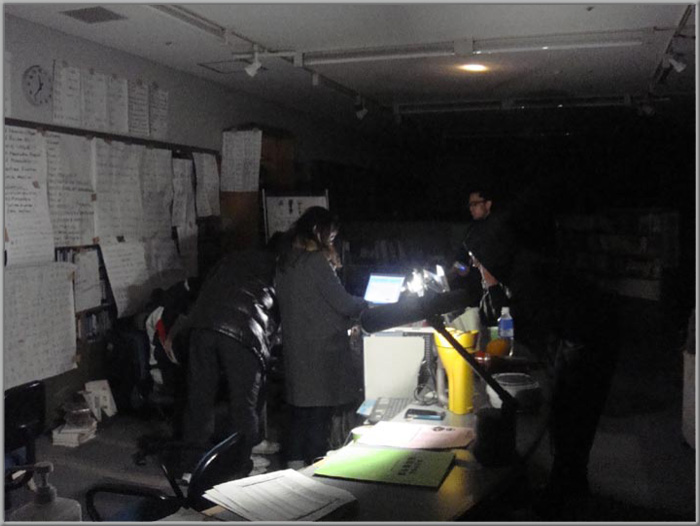
Caption: Two days after the quake, foreign volunteers man the phone lines in darkness.
Credit: COURTESY OF SENDAI INTERNATIONAL RELATIONS ASSOCIATION
Foreign Volunteers on the Front Line
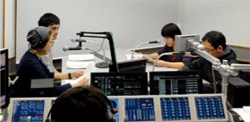
Foreign volunteers recording disaster-related information in their native languages for broadcast on FM radio.
Credit: COURTESY OF SENDAI INTERNATIONAL RELATIONS ASSOCIATION
According to Nobuko Sudo of the Sendai International Relations Association, "For ten years we've been training volunteers in Sendai to assist foreigners in time of disaster. In April of last year we decided that in the event of a big disaster we would establish the Support Center as a base for providing linguistic assistance to foreigners."
On the evening of the day of the earthquake, March 11, staff members and volunteers began conducting operations as soon as the Sendai International Relations Association set up the Support Center in the Sendai International Center.
At first, broadcasts of information on the disaster were made in simple Japanese, English, Chinese and Korean from an FM station within Sendai City. After that, new information was constantly disseminated in those languages not just over the radio but via the Internet as well.
In addition, they went to the shelters around Sendai to confirm the safety of foreigners and to distribute information.
Since the situation has become more stable, the Support Center concluded these operations on April 30. At its busiest, around twenty staff members and more than thirty volunteers were conducting activities.
"It was a big help having the foreign volunteers post information on Facebook and Twitter," says Sudo. "Hopefully the efforts of the Support Center were able to ease the worries of those foreigners who cannot understand Japanese."
A large number of foreign volunteers participated in the activities of the Support Center following the Great East Japan Earthquake. Osamu Sawaji of the Japan Journal spoke to Niu HaiLi from China, Lee Sihngeum from South Korea and El Moutaouakil Amine from Morocco, who are exchange students at Tohoku University. All three had received training as linguistic volunteers in time of disaster from the Sendai International Relations Association before the quake.
Where were you at the time of the earthquake, and what activities were you involved in as a volunteer?
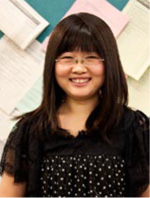
Niu HaiLi
Niu HaiLi came to Japan four years ago from China and entered Tohoku University. At the time of the earthquake, she was enrolled in the first term of the doctorate program at the Graduate School of International Cultural Studies, Tohoku University. She has now graduated.
Credit: MASATOSHI SAKAMOTO
In the days following the quake, I stayed in Sendai for several days to translate information about the disaster, record disaster information in Chinese for broadcast on FM radio, and visited shelters to provide information to foreigners there.
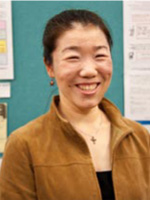
Lee Sihngeum
Lee Sihngeum came to Japan from South Korea eleven years ago and entered Tohoku University. She is presently enrolled in the School of Law, Tohoku University doctorate program.
Credit: MASATOSHI SAKAMOTO
I began volunteering at the Center the next day. I answered calls about the safety of individuals from Japan and abroad, translated disaster information, recorded disaster information in Korean for FM radio broadcast, and went around to the shelters to give information to foreigners.
Things are expressed differently in the Japanese and Korean languages, so I did my best to translate using words that anyone could understand. Also, when I spoke directly with Koreans on the phone or at the shelters, to people who wanted to check on the safety of others, or to disaster victims, I always tried to do so by empathizing with them. For example, I would listen earnestly to those with questions, and do my utmost to accurately communicate the information I had received at the Center or from the TV news. I would also try to make them not feel isolated by saying, "Whenever you feel anxious, give us a call."
El Moutaouakil Amine: I was in a laboratory on the fifth floor of a building on campus at the time of the earthquake. I was surprised by the shaking, and hid under a table. A computer fell off of a desk and broke. As part of the disaster preparedness training I had before the quake, I was able to experience an earthquake in an earthquake simulation truck, but the actual shaking was even stronger than that. After the quake subsided, I visited a few of the shelters near the university to check if there were any foreigners there. At one shelter there was a Frenchman who couldn't speak Japanese, so I stayed there for the night.
Why did you decide to remain in Japan after the earthquake?
Niu: I wanted to help out as a volunteer. I didn't want to go straight back to my country. Also, when I saw people in Sendai going back to work just like they always had, and the way the Japanese volunteers handled things so calmly, I decided that staying in Sendai would be OK. My mother in China was terribly worried, so I did go back on March 25, but when I listened to what my friends in Sendai said, I decided that it was safe there. My family wanted me to stay a little longer in China since there was still trouble with aftershocks and the accident at the nuclear power plant, but I explained that life for people in Sendai had already returned to normal, and came back to Japan on April 15. After returning I went back to handling inquiries about people's safety and translating just as I had done before I went to China.
Lee: My parents and friends who live in Korea were very worried, and urged me to return home. But I felt I wanted to look out for those who were rebuilding in the disaster stricken areas and dealing with the accident at the nuclear power plant. And after the earthquake many of my Japanese friends phoned or emailed me to say, "Are you all right?" or "Do you have enough food?" I wanted to stay in Japan to show my appreciation for their kindness.
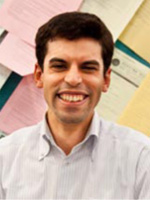
El Moutaouakil Amine
El Moutaouakil Amine came to Japan from Morocco five years ago and entered Tohoku University. He is currently enrolled in the School of Engineering, Tohoku University, majoring in Electrical and Communication Engineering.
Credit: MASATOSHI SAKAMOTO
How would you like to put to use the experience you gained as a volunteer?
Niu: Throughout this disaster, many of my Japanese friends supported me emotionally, always asking "Are you all right?" Also, through my experience of the volunteer activities I came to understand the importance of translating using the correct words, so I think I'd like do some kind of interpretation work in the future.
Lee: Even though this earthquake was a natural disaster like no one has ever experienced before, I felt the victims didn't feel any resentment about it, and just went on dealing with things positively. I felt so happy when one of the Japanese students to whom I taught Korean told me, "You must have been really frightened. You come from Korea where there are no earthquakes, but still you did volunteer work. I really admire you for that."
After this disaster, many new laws will become necessary in Japan which could become examples for Korea. In the future I'd like to bring together Japan and Korea in the area I'm currently studying, law.
El Moutaouakil: Right after the quake, at one of the shelters I saw Japanese victims take the food that had been handed out to them and give it to foreigners who had also taken shelter there. I was very moved to witness these sights of people helping each other out even when they cannot communicate in words.
After having gone through this experience, my interest in how earthquakes are predicted and how damage can be reduced has been heightened.
© 2009 Cabinet Office, Government of Japan






